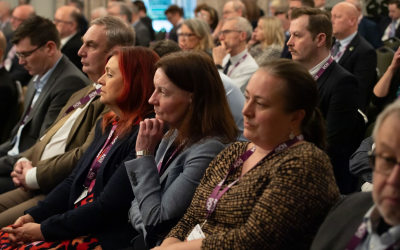Responding to Theresa May’s keynote speech on NHS funding, Cllr John Fuller, Chairman of the District Councils’ Network, said:
“Whilst we welcome the announcement of an additional £20 billion promised for the Health Service, we will only get full value if we focus on prevention to keep people healthy and prevent illness.
“District councils are the prevention authorities. Good housing, the promotion of active and healthy lifestyles and solving social problems are key factors in health and wellbeing which in turn keep people out of hospital for longer.
“The role of the councils is to help people of all ages lead independent and fulfilled lives for as long as possible and, should they require inpatient help, to get them back out again as quickly as possible to reduce the burdens on acute services. It is essential that a significant part of the £20 billion is devoted to a plan that integrates health and social care and which can respond to people’s individual health needs.”
Notes to Editors
Prevention work by district councils, in tandem with health partners, is helping to reduce pressures on the NHS by helping people to live more independent lives. They include:
- Wealden District Council is working with GPs to prescribe community activities, including coffee mornings, singing workshops and walking groups which has seen them improve their mental health, increase their physical activity, lose weight or reduced their medication requirements, and reduce subsequent GP appointments.
- South Norfolk District Council has seen 187 patients access its ‘Help Hub’ in its first six months, a social prescribing scheme under which patients who attend surgeries for non-medical issues can be referred for direct access to practical help and advice. 73,057 patients have access to social prescribing at present, of which 45 per cent had their identified needs met in the initial appointment, where they received tailored information and advice; 98 per cent of cases were not escalated to statutory services.
- In Blaby, Leicestershire, the county and district councils worked with the NHS to develop a housing support service, which providing housing ‘MOTs’ to identify immediate safety risks and make adaptations. It also provides grants, advice and information about how to access wider support. They are also working with Leicestershire hospitals to support discharge and prevent readmissions. The project led to a reduction in use of some services by 66 per cent, and lower A&E attendances and emergency admissions. Last September, the scheme was estimated to have saved the NHS more than £435,000 and has been extended across the county.
- Wycombe District Council’s ‘Healthy Homes on Prescription’ allows medical or social care practitioners to refer patients for simple, fast-tracked housing solutions to support independent living at home. In the scheme, people with a long-term chronic health condition can apply for up to £5,000 without means testing to help support their physical and mental well-being at home, preventing hospital admission and GP attendances. It is already saving the NHS £53,476 and social care £132,984.
- By increasing uptake of physical activity by residents, Chiltern and South Bucks District Council estimate that it is saving local healthcare services more than £65,000, and yielding a further £365,168 in wider health benefits such as quality-adjusted life years.
- In Haverhill, Suffolk, a pilot scheme run by ONE Haverhill Partnership and St Edmundsbury Borough Council has seen GPs refer patients to meet a ‘LifeLink’ Coordinator who spends time getting to know them and helping them connect with people and activities in their area. The programme will help the NHS to prioritise resources by avoiding unnecessary repeat GP and other appointments, saving prescription costs and increasing employment opportunities for local people.
ENDS
District Councils’ Network media office, 020 7664 3333






